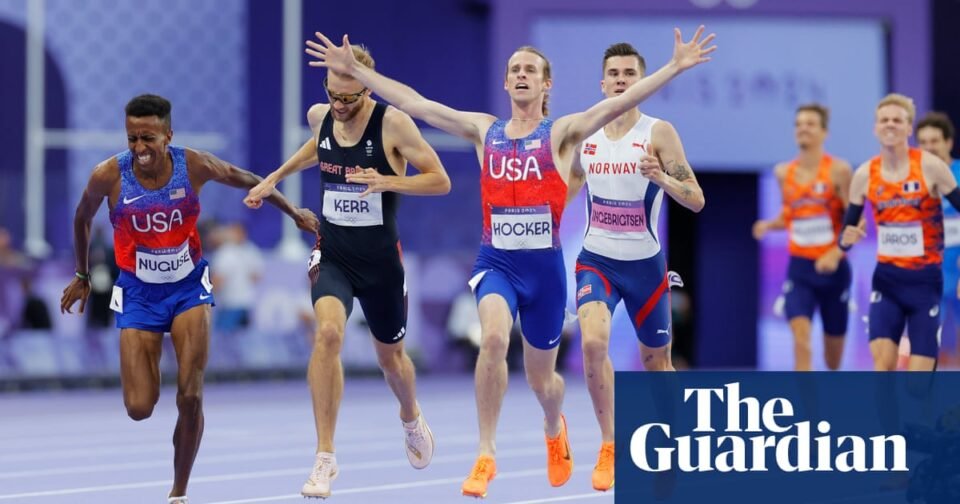Over the hardest three laps of his life, Cole Hocker clung on with the stubbornness of a mule. Then he kicked like one. First the American flew past Jakob Ingebrigtsen, the Tokyo Olympic champion. Then, in the final strides of an Olympic men’s 1500m final for the ages, he cut inside the world champion Josh Kerr.
Suddenly and without warning a God-fearing 23-year-old from Indianapolis, who had been a 37-1 underdog beforehand, had a shock gold medal around his neck.
They called Marvin Hagler’s extraordinary fight with Tommy Hearns, The War. This Olympic 1500m final was the track and field equivalent – with a twist that nobody expected.
Such was Kerr’s determination to win Olympic gold in Paris that he ran twice on Christmas Day, eight miles in the morning followed by another three after a heavy dinner. Over the past few months he has also leaned out like a boxer making weight, and studied his rival’s races with a monastic focus.
And until Hocker’s late strike, the 26-year-old from Scotland must have thought he was winning an Olympic title. For most of the race he tracked Ingebrigtsen, before going clear with 70m remaining. But Hocker, who had been blocked off earlier by the Norwegian, had enough left to attack again on the inside to win in 3mins 7.65sec.
Kerr hung on for silver in 3:27.79, a new British record, while another American, Yared Nuguse, claimed bronze in 3:27.80. Incredibly Ingebrigtsen, the pre-race favourite, was fourth in 3:28.24.
“I can’t walk away from the championship disappointed,” Kerr said. “I ran the fastest and best tactical 1500m I’ve ever done in my life and so when you start worrying about what everyone else does, from the results, you’ll never be satisfied.”
One of the American’s pre-race rituals is to pray. And this Olympic final couldn’t have worked out any better. “It’s an unbelievable feeling,” said Hocker. “I just felt like I was getting carried by the stadium and God. My body just kind of did it for me. My mind was all there and I saw that finish line.”
He added: “Winning gold was my goal this entire year. I wrote that down and I repeated it to myself even if I didn’t believe it. My performances showed me that I was capable of running 3:27, whatever it took. I knew I was a medal contender, and I knew that if I get it right, it would be a gold medal.”
The tale of the tape beforehand suggested that the 23-year-old Ingebrigtsen had the edge. He was the reigning Olympic champion. The fastest man in the world this year. And last month set a personal best of 3:26.73 – over two seconds quicker than Kerr.
But this was a championship race not a contest on the Diamond League circuit, where a phalanx of pacers can set the race up for the Norwegian.
There was no hanging about as Ingebrigtsen attacked after 100m to try to set the pace and his opponent’s lungs on fire. The first 400m came and went in 54.82. The second in 51.51.
At that point, Ingebrigtsen was about five metres clear of Kenya’s Timothy Cheruiyot in second, with Kerr a couple of metres back in third. But Kerr was closing. With 250m to go he was right on his great rival’s shoulder.
“I knew we had to weather a storm early, keep calm and make sure we stayed emotionally as locked in as we could. At 600m to go I felt I had quite a lot left and coming off that last bend I got pushed out a little bit,” said Kerr.
“I was able to come round Jakob but there is a lot of running left at that point. It is so difficult to keep track of everything that is going on in the last 100m.”
You couldn’t blame Kerr for focusing on Ingebrigtsen. There are border conflicts whose history is less bitterly contested than their rivalry – especially since last year’s world championship.
After that race, the Norwegian said he been suffering from a sore throat and didn’t feel 100% – claims that had Kerr rolling his eyes.
Since then the Scot has accused his opponent of having a “high ego”, being surrounded by “yes men” and having “flaws in the manners realm”. Two days ago Kerr also predicted that this would be “most vicious 1500m” in a long time. He certainly got that right.
But all that talk was irrelevant to Hocker. “I kind of told myself that I’m in this race too,” he said afterwards. “If they let me fly under the radar, then so be it. I think that might have just been the best.”
As for Ingebrigtsen, he admitted that he may have pushed the pace too hard because he felt so good at halfway.
“I saw that I got a starting gap, and I was a little bit eager,” he said. “Of course, it’s not what I was hoping for. I can only blame myself. It’s a difficult game, balancing your energy. It’s difficult to get 100% of that.
“It’s not as fun if I’m not able to get the results I want. But the others did a great race. This was a risk I was going to take.”
It led to a great race, just not the result either he or Kerr ultimately wanted.

